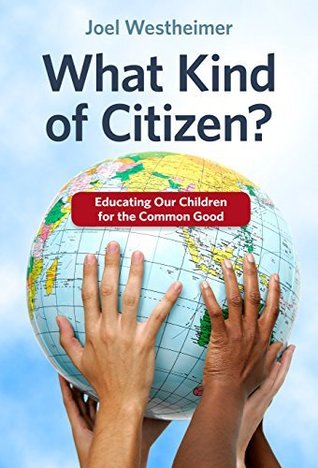What Kind of Citizen?

A key purpose of education is to prepare students to be good citizens. Few people would argue with this statement, but what does it mean to be a good citizen? What kind of citizenship are we talking about?
When I was completing my post-baccalaureate degree in Education for Sustainability, I read an article by Joel Westheimer and Joseph Kahne called "What Kind of Citizen? The Politics of Educating for Democracy" It outlined the different kinds of citizenship that schools foster. It was a turning point for me as an educator. I was pleased to find Joel Westheimer had expanded on his ideas in the book What Kind of Citizen: Educating Our Children for the Common Good. He describes three types of citizens. The personally responsible citizen acts responsibly in the community by following laws, being honest, and lending a hand during a crisis. This type of citizen might pick up litter or donate to food drives. Westheimer points out that this type of citizen would be equally at home in a democracy or dictatorship, since they do not involve questioning the status quo.

The other two types of citizenship are particularly important in a democratic society. The participatory citizen takes an active role in community organizations and improvements. This citizen believes that by participating actively within the established systems, they can work to improve their community. The social justice oriented citizen looks for the root causes of problems and questions established structures. They seek to change systems if they are causing injustice. So while a participatory citizen might organize a food drive, a social justice oriented citizen would question what is causing people to be hungry in the first place.
In his book, Westheimer outlines studies examining different school programs and what kind of citizenship they are emphasizing. He indicates that both participatory citizenship and social justice oriented citizenship are important for a healthy democracy, and the skills associated with each citizenship are valuable in different ways.
Over the course of my teaching career, I have journeyed through each type of citizenship education to varying degrees. I initially focused on personally responsible citizenship, taking the Free the Children models of coin drives and canned food collection. Eventually, it became clear that students didn't understand with great depth why they were organizing bake sales or donating to charity and I became dissatisfied. I decided to change my approach and emphasize researching community problems in my social justice club, prior to pursuing solutions. This yielded some better results, but I feel the social justice oriented skills they were developing were still only scratching the surface.
In truth, I would like to bring more social justice oriented citizenship and participatory citizenship into my grade seven classroom. Last year, I had students participate in a classroom story activity, where they took on roles of townspeople being impacted by the proposed construction of an oil pipeline. Throughout the unit, students investigated economic, social and environmental perspectives relating to the issue, in order to develop a better critical understanding of the situation. By analyzing a real sustainability issue and its key points of view, I intended to encourage social justice oriented citizenship. I'd be curious to see whether these citizenship skills and attitudes were ultimately retained. Are my students more likely to critically question what forces impact societal problems? Would they know how to take action to tackle these problems? How can I better encourage students to actively participate in solving community issues? These are important questions to ask as I continue educating students in social studies. I'm looking forward to seeing how I can delve deeper with my students using Westheimer's work as a guide.
